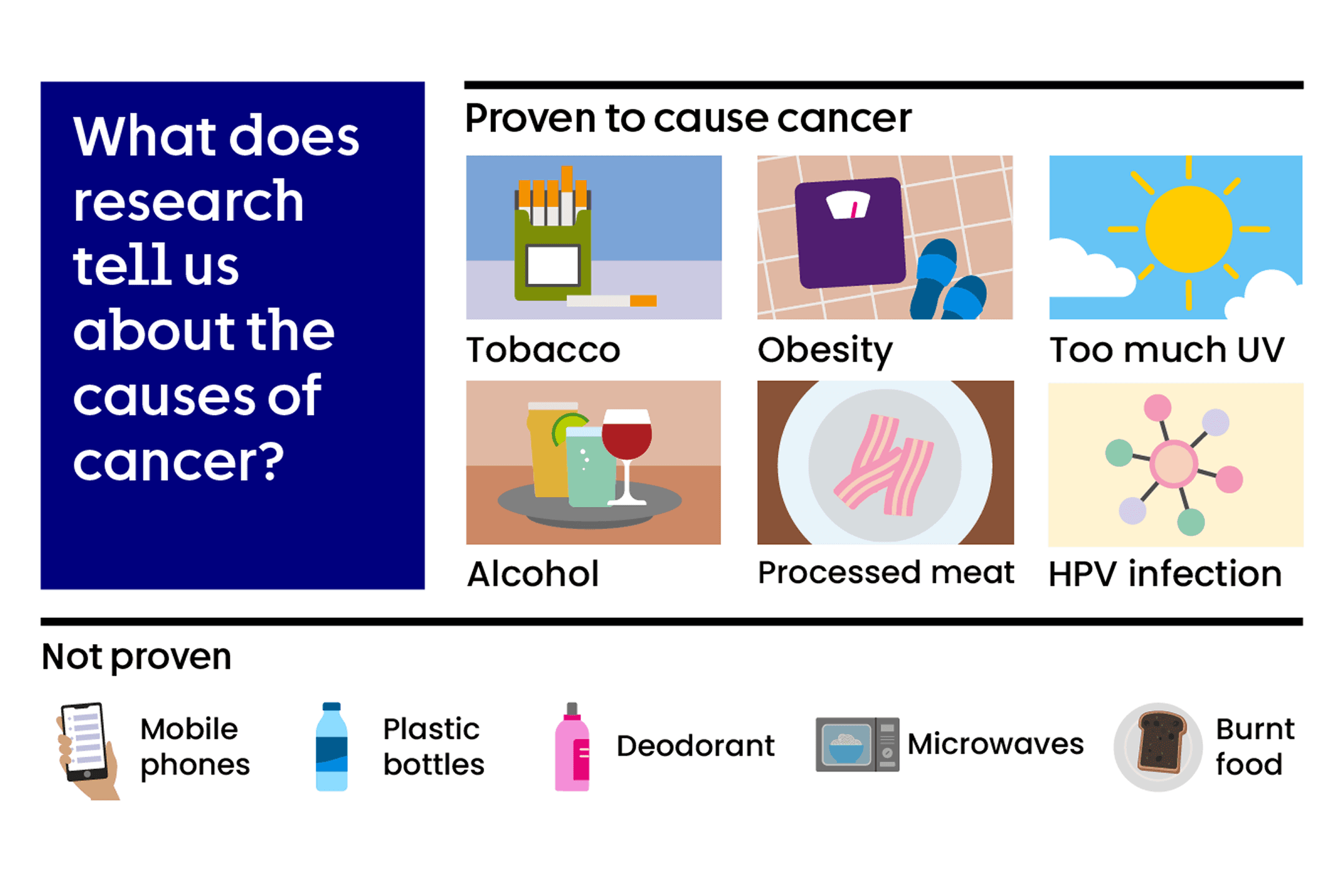Cancer myths and common questions
The safety of cosmetic products is a hot topic in the media. In recent years, there have been news headlines linking certain cosmetics to cancer.
These headlines can be worrying and have resulted in misinformation about cosmetics and cancer. However, the scientific evidence doesn’t suggest that we need to avoid using cosmetics.
On this page, we answer common questions about popular cosmetic products and cancer.
Cosmetics bought in the UK and EU should be safe to use and are unlikely to cause cancer.
The UK and EU have strict rules controlling the ingredients in cosmetics. This aims to ensure that cosmetics for sale in the UK and EU are safe. Some substances are banned in cosmetics. Others are restricted to small amounts or ‘rinse-off’ products.
Always buy cosmetics from a reputable retailer
Use cosmetics in line with manufacturer instructions.
Take care if you are buying products online. Cosmetics from outside the UK and EU may not be regulated by the same rules.
In the sections below, we take a closer look at the research on specific cosmetic products and cancer risk.
There’s not enough evidence to say that talcum powder causes cancer.
Some studies suggest an increased risk of ovarian cancer in women who used talcum powder on their genitals. But other more reliable studies do not find a link between talcum powder and ovarian cancer.
More research is needed to be able to say whether using talcum powder increases the risk of ovarian cancer.
Talcum powder and cancer have been in the news. These headlines are usually related to past-use of talcum powder which was potentially contaminated with asbestos. Asbestos is a known cause of cancer. Nowadays the UK and EU have strict regulations for cosmetics sold in the UK, including talcum powder. So talcum powder sold in the UK today shouldn’t contain asbestos.
In 2022, there were concerns about the safety of specific dry shampoo products in the US. Some were shown to contain benzene, a chemical known to cause cancer.
Benzene can increase the risk of cancer if people are exposed to high levels over long periods of time. For example, through smoking cigarettes or working with benzene. It’s very unlikely that the amount of benzene in these dry shampoos could cause cancer.
There is no research showing a link between using dry shampoos and increased cancer risk.
Using deodorants, antiperspirants and body sprays does not increase the risk of cancer.
Some people are worried that aluminium in deodorants and aerosol sprays causes breast cancer. In part this worry stems from these products being applied near the breast.
But the best studies have shown no link between aluminium, deodorants and breast cancer.
There is no strong evidence that the personal use of hair dye causes cancer. This includes regular root coverings, balayage and changing your hair colour.
There is some evidence that daily contact with hair dye, for example by hairdressers and barbers, may increase the risk of bladder cancer. But more research is needed before we can say this for sure.
There is no evidence that using fragrances (perfumes) causes cancer.
The misleading idea that toothpaste could cause cancer came from one animal study.
Titanium dioxide, which is an ingredient in toothpaste, was given to rats. And the rats developed precancerous growths in the intestines.
But this result in rats cannot be applied to people in the real world. So, this study doesn’t show that using toothpaste increases our risk of cancer.
There’s no evidence from studies of people to suggest that toothpaste causes cancer.
Parabens do not cause cancer.
Parabens are used in some cosmetic products to make them last longer.
Some studies in rats reported that parabens might act like the hormone oestrogen. Because oestrogen is involved in some breast cancers, some people may worry that parabens could be linked to breast cancer.
But there’s no reliable evidence that parabens cause breast cancer in people.
Some people are worried that underwired bras restrict the circulation of lymph fluid and cause toxins to build up, leading to breast cancer. But there’s no evidence for this.
Wearing a bra, including underwired bras, does not increase your risk of breast cancer. This includes if you wear it overnight.

There are many myths, questions and hot topics when it comes to cancer risk. But thanks to decades of research into preventing cancer, we know of proven ways to lower the risk of cancer.
These include not smoking, keeping a healthy weight, staying safe in the sun, cutting down on alcohol and eating a healthy, balanced diet.
Last reviewed: 19 Dec 2024
Next review due: 19 Dec 2026
Questions about cancer? Call freephone 0808 800 40 40 from 9 to 5 - Monday to Friday. Alternatively, you can email us.